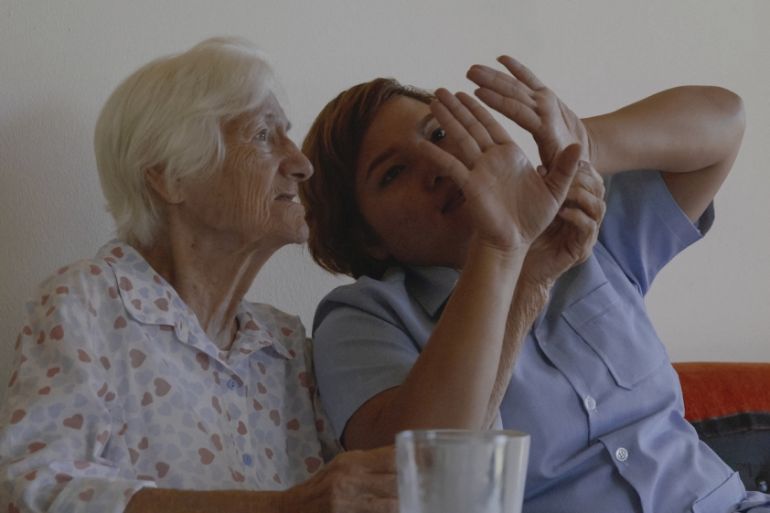
Kissing Mother Goodbye: A Story of Love and Sacrifice in Thailand
A caregiver in Thailand looks after foreign Alzheimer’s patients for a living, but time away from family takes its toll.
Editor’s note: This film has been removed from online.
Baan Kamlangchay is a care centre for foreign Alzheimer’s patients located in Chiang Mai, Thailand.
Keep reading
list of 4 itemsFirst pig kidney in a human: Is this the future of transplants?
Why are some countries decriminalising drugs?
‘No good evidence’ for gender care for youth over long-term, review finds
There, each patient receives personal care around the clock, through three caregivers.
Pomm is one of those caregivers. She has developed a close bond with those she looks after, finding solace in speaking to them and learning about their lives. One of her patients, Elisabeth, she affectionately calls “mum”.
But Pomm lives far away from her family and sacrifices time with her own mother and children so she can earn a better living to support them – a compromise that takes its toll.
Meanwhile, in Switzerland, a family prepares to say goodbye to their mother Maya, who developed Alzheimer’s in her 50s and is moving to Thailand to receive better care.
This film, Kissing Mother Goodbye, shares intimate stories of patients and their caregivers, exploring the moments of joy and sacrifice that come with looking after loved ones.
FILMMAKER’S VIEW
By Kristof Bilsen
I am always looking for stories about the “micro” that work on a “macro” level as well.
In my previous film, ‘Elephant’s Dream’, I told the story of people in a post-colonial reality, by focusing on public sector workers stuck in jobs in a state of decline.
With this film, the focus was more personal; it was to do with my mother. We lost her this spring. But she had been suffering for quite sometime before that. She went downhill for many years until, eventually, we felt a point of no return approaching. We considered the options: what would be the best for mum? Would it be informal care at home? Would it be a care centre? If so, what would the consequences be?
I threw myself into researching various approaches to elderly care, and one of them was thinking “beyond” borders. In my research, I found out about a place in northern Thailand, which houses only 14 patients who each receive 24/7 care by means of three caregivers per patient. We initially went there for a two-week research trip. While researching, I met Pomm.
I mainly fell in love with her and Elisabeth (the person she was then caring for) because I saw them as a grandmother and a child rather than a Thai woman and a Swiss “guest”, as they call patients.
Pomm could be a character, I thought. Without really knowing her back story, it was just the dynamic and bond between them that struck me as a good way into the story.
What I prefer to do when making a documentary is to trust the process. A story leads you where you need to be. In the case of Pomm, that was key to the film. Quite soon, Pomm began talking about her children and about what she had to cope with as a single mother. In doing so, she sort of almost gently diverted me towards thinking: this is actually the story that we are going to tell.
We also wanted to follow a new guest arriving from Switzerland. It was serendipitous because we were gently warned that if we wanted to film a new guest, we had to be aware that it was a very stressful time for everyone. Families are stigmatised and receive a lot of judgement from people in the West, who question how they dare to outsource someone’s care all the way to Thailand.
But then, suddenly, I received an email from the man running the centre who said there was a new guest – Maya – arriving, and her family wanted to meet me. So I went to Zurich and met them. Fortunately, I already had some scenes shot that I could show them, so they at least had an idea of what I wanted to do.
I was also very upfront about my own messy situation – I talked about my mother, how we were struggling, and how it was a huge taboo when she went to a care centre instead of receiving care at home. I was just being very honest with them and, eventually, they agreed for us to go on this journey together.
For me, it is really important that I take my time while making a film. That is why the final piece is always a mixture of the poetic and the observational, but all weaved together into a good human story. Key to this is that the characters I work with ultimately get the agency they deserve.
In order to really delve into the complexities of Pomm’s life as a single mother and caregiver, and to understand the Swiss family’s motivations, I really needed time to tell the story properly – you cannot do this in half a year.
Filming technically began in fall 2016 and ended in spring 2018. And then there was an editing process of four months. We shot about 50 to 60 hours of footage.
What I want people to take away from the film is a sense of empathy, to be open to discussion, to see that a topic like caregiving is not something that you need to hide away from – it is just part of the continuum of life.